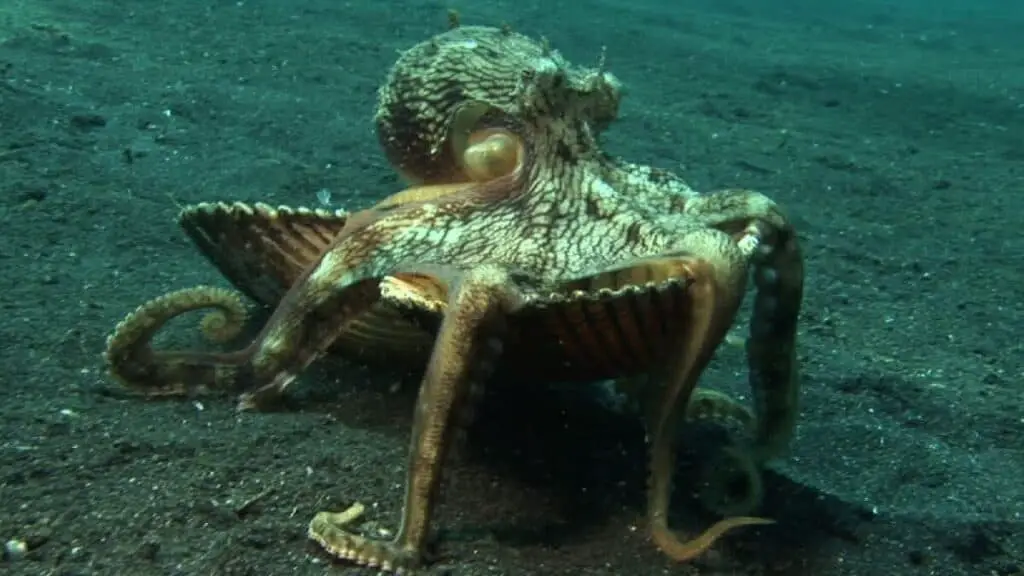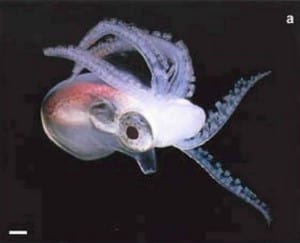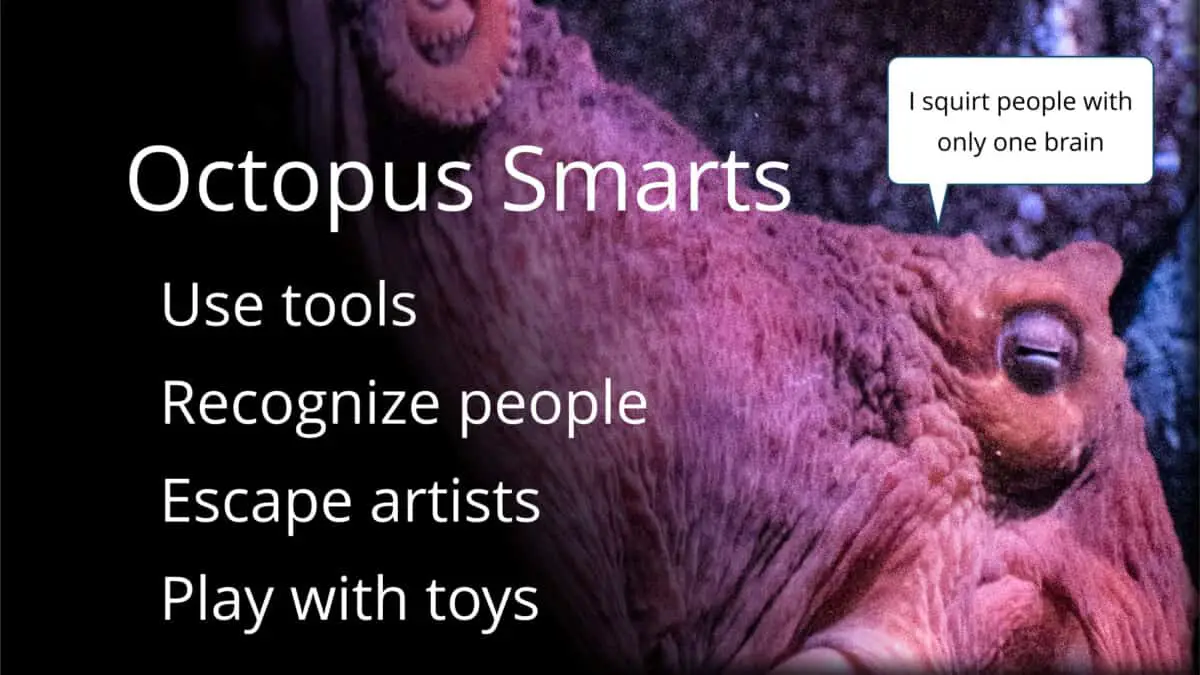Cephalopods, including octopuses, are the smartest invertebrates on the planet. They can use tools, carry coconut shells for shelter, stack rocks to protect their dens, and carry jellyfish tentacles for defense. In captivity, they can learn to solve puzzles, open screw-top jars, and squirt humans they don’t like. And they are about as smart as your average dog.
How Can an Octopus Turn out the Lights?
Octopuses living in captivity are smart enough to turn out the lights with jets of water.
Otto the octopus, at the Sea Star Aquarium in Coburg, Germany was taught to aim and squirt water at visitors. (Remind me not to visit!) One night, Otto climbed up the side of his tank and squirted water at the 2,000-watt spotlight overhead, shorting out the aquarium’s entire electrical system.
Staff managed to get the system working in the morning, and the next night it happened again. And again the next night.
“Every day for like two or three days, when you get into the aquarium, you know, it’s just silent. Nothing is working,” reported the Director. “And on the third day, we just had to know what was happening.”
Some of the staff spent the night in the aquarium, watching and waiting, but saw nothing. In the morning when the director turned on the lights, she saw Otto the octopus shooting water at his lights.
It appears that Otto was smart enough to figure out how to turn out the lights and to make the connection between turning out the lights and watching humans run around in a commotion. Or perhaps Otto just preferred to sleep in the dark…!
What is Intelligence?
In response to the question about intelligence, neuroscientist Daniel Levitin writes, “There are great disagreements about what intelligence is and how to measure it. I’ve come to believe that intelligence is the ability to apply knowledge in novel ways, making links between things that weren’t seen as linked before. And intelligence predicts how well we are able to adapt to changing environments.”
We’ll see in this article how this description is fitting when it comes to octopus intelligence.
Octopuses demonstrate novel ways of applying knowledge, making new links, and adapting to changing environments.
How do You Measure Animal Intelligence?
One benchmark indication of cognitive sophistication is the use of tools. Originally, tool-use was regarded as a defining feature of the human species and thought to be unique to us as humans.
In 1960, Jane Goodall observed chimpanzees making tools by stripping the leaves off twigs, and then bending and using the twigs to probe for termites. In documenting these observations, Goodall was certain that she had identified tool-use among chimpanzees.
Tool use among a non-human species was considered so improbable at the time that her conclusions were met with incredulity.
“Now we must redefine ‘tool’, redefine ‘man’, or accept chimpanzees as humans.”
Louis B. Leakey’s famous response to Jane Goodall about her observations of chimpanzees using tools.
Ever since the ‘60s, scientists have described a growing number of mammals and birds that can use tools.
See my article on how crocodiles can use tools to attract birds.
It doesn’t hurt to have 9 brains!! Octopuses have mini-brains in each arm and a central brain to keep everything coordinated!
Learn more by reading one of my most popular articles Why do Octopus have 3 Hearts, 9 Brains, and Blue Blood? Smart Suckers!
How do Octopuses Use Tools?
Until recently, there weren’t any reports of invertebrates using tools. However, in the past few years scientists have discovered that some octopuses can acquire items that they use as tools when the right opportunity comes along.
Octopuses Can Make Improvised Shelters for Protection
In the waters off Indonesia, octopuses living on soft sediments have been observed carrying the half shells of empty coconuts or clam shells for use as a shelter when needed. An octopus can carry awkward shaped shells using a cumbersome form of locomotion referred to as ‘stilt-walking’.
Imagine a person walking on tippy toes, holding an empty laundry tub between their knees. Except the octopus has eight arms instead of two legs to keep coordinated for this tricky maneuver. And no knees (or is it all knees?).

Watch this informative video of an octopus carrying a coconut shell by LaTrobe University in Australia
Why is this considered tool use?
One of the key features of tool use is that there’s no benefit to having a tool until it is used for its intended purpose sometime in the future. Hermit crabs, for example, live inside snail shells for protection but the shell is not considered a tool since the shelter is in use all the time.
The coconut-carrying octopus, on the other hand, is using a tool, since it is keeping its half coconut shell handy for a specific purpose. There is no benefit to carrying a cumbersome shell around just for the sake of having the shell… until it is needed for protection. As a scientist would say, the shell has an immediate cost with a deferred benefit.
Octopuses Can Plan Ahead
This demonstrates a high level of cognitive ability because it shows that octopuses can plan and strategize by making connections between past events, current actions, and future events. Who would think that a creature that is basically a super-charged clam or mollusc would be capable of planning ahead?
Isn’t this the same as the way we use our tools? I have some special wrenches that I keep only for specific jobs around the house, but I like to keep them handy in my toolchest. These tools are non-functional until deployed for a specific task that I have to plan ahead for (usually involving fixing a toilet!).
This reminds me of one of my favorite sayings: “Don’t try to make your lack of planning into my emergency!” Perhaps an octopus would make a good roommate!
Octopuses Can Carry Jellyfish Tentacles for Defense
Young female blanket octopuses (Tremoctopus violaceus) have been observed carrying the tentacles of Portuguese man-o-war jellies with their suckers and wielding them like little stun batons.
One scientist (Jones 1963) described his experience with one of these blanket octopuses this way, “I dip-netted one of these from the water and lifted it by hand out of the net. I experienced sudden and severe pain and involuntarily threw the octopod back into the water.”
Sudden and severe pain would normally give a person a good reason to stop doing whatever they were doing! Of course, a committed scientist might decide to forge ahead!
Jones continues:
“To determine the mechanism responsible for this sensation 10 or 12 small (40 to 72 mm total length) octopods were captured and I purposely placed each one on the tender areas of my hands. The severe pain occurred each time, but careful observation indicated that I was not being bitten by the octopod. The pain and the resulting swelling and inflammation. which lasted several days, resembled the stings of the coelenterate Physalia, the Portuguese man-of-war, which was quite abundant in the area.”
Now, that’s going beyond the call of duty! At least Dr. Jones did get an article out of the painful experiment.
Here’s an octopus that has figured out how to use stinging cells from another animal for its own defense. It is thought they are immune to the jellyfish’s venom.
These jellyfish tentacle weapons might be used for more than defense. Perhaps blanket octopuses also use the stolen tentacles and stinging cells to stun or kill prey.
Pretty good signs of octopus intelligence, I’d say!
Fascinating Fact
Adult female blanket octopus are 10,000 times bigger than the males! With most animals, the male is bigger and flashier. Not so for the blanket octopus. The females are much larger, reaching up to 2 meters or 6.6 ft in length. The males, on the other hand, are the size of your thumb.

If you are interested in tiny parasitic males that are only interested in weird sex, you will find my article on Anglerfish sex right up your alley!
Octopuses Can Recognize Individual People
Octopuses will remember people they consider annoying and will often target them with jets of water.
It is not easy to recognize individuals outside of your own species, although some mammals and birds can do it.
Crows for example can recognize human faces. Think about it – can you recognize individual crows by sight? I know I can’t. This is no easy feat!
Turns out that octopuses can recognize individual humans and show whether they like them… or not.
Researchers at the Seattle Aquarium designed an experiment to test the ability of giant Pacific octopuses to recognize individual humans.
Wearing identical uniforms, one person consistently fed a group of eight octopuses, while another person would touch them with a bristly stick. After each interaction they recorded the octopuses body patterns, behaviors, and respiration rates.
After two weeks of this treatment, the octopuses had differentiated between the ‘nice’ keeper and the ‘mean’ one and had a significantly different response to the two individuals.
One well-known story relates how an octopus in the lab at the University of Otago in New Zealand took a dislike to a particular staff member. Whenever that individual walked near the tank, the octopus would aim at her with its jet and shoot half a gallon of water onto her back or neck.
At the New England Aquarium, an octopus named Truman took a dislike to one of the female volunteers. Truman would shoot a stream of water at the young woman whenever he had a chance. Several months after leaving for college, she returned for a visit to the aquarium. As soon as Truman spotted her, he let loose with his jet and instantly soaked her again. He hadn’t squirted one other person during the entire interval of several months! Talk about harboring a grudge!
Moral of the story: don’t disrespect an octopus if you want to stay dry!
Watch this Video – you won’t be disappointed!
In researching this article I’ve delved into the latest research and have viewed dozens of octopus-related YouTube videos. The following video by Nature stands out as one of the best I’ve seen. It does an excellent job of showing how the octopus genome is responsible for many of the amazing abilities and adaptations that I’ve covered in my series of octopus articles.
Octopus genome makes for one smart sucker!
Octopuses are Good Problem Solvers
Cephalopods, including octopuses, are good at solving complex puzzles that require manipulating levers or pushing and pulling something. They can unscrew the lids of containers to get at the fish inside and they can learn to open child-proof pill containers.
Octopuses can assess tricky latches on clear acrylic boxes and figure out how to open them in order to get at the food inside.
They can figure out how to solve puzzles and when presented with the puzzle later they can remember the solution. As long as they stay interested, they will keep solving puzzles, even variations of old puzzles presented in new configurations.
There are famous stories about octopuses leaving their tanks to visit neighboring tanks for food. At the Brighton Aquarium in England, one octopus would leave its tank at night when no one was watching and make its way to the tank next door. The aquarium lost several lumpfish before they figured out what was happening. Each night, the wandering octopus would eat one of the lumpfish and go back to his own tank in time to be sitting there the next morning. It is tempting to anthropomorphize and use the words “looking innocent” – but I won’t go there!
Octopuses Can Cooperate With Fish
According to recent research (Sampaio 2021), octopuses have been known to cooperate with groupers and other fish as they hunt for prey.
In the underwater world, there are certain species of fish and octopuses that form collaborative hunting groups to catch their prey. These groups consist of a combination of different species working together to increase their chances of success.
However, an interesting behavior has been observed where the octopus physically punches its fish partners during these hunting activities.
At first glance, this punching behavior might seem aggressive or even harmful. However, researchers have discovered that it actually serves as a control mechanism for the octopus to promote cooperation among the group. By punching the fish partners, the octopus imposes costs on them in the form of missed opportunities to catch prey or being displaced from advantageous positions.
Despite what we might consider bothersome behavior, the fish partners still cooperate with the octopus for several reasons:
- Immediate benefits: Despite being punched by the octopus, the fish still derive benefits from collaborating with it. This could be due to increased hunting success or accessing resources they couldn’t acquire on their own.
- Future cooperation: The punching behavior acts as a way for the octopus to enforce future collaboration from the fish partners. By imposing costs through punching, the octopus encourages continued cooperation in subsequent interactions.
- Negative reciprocity: The punching behavior establishes a form of negative reciprocity or punishment. The octopus pays a small cost (the energy spent on punching) to impose a heavier cost on fish partners that misbehave or don’t cooperate fully.
The specific benefits and costs vary depending on factors like prey availability and competition within the group. Overall, despite experiencing short-term costs from being punched by the octopus, the fish partners recognize that cooperating with it brings long-term advantages and increased chances of successful hunting.
To put it simply, even though getting punched might not feel good for the fish partners, they realize that working together with the clever octopus ultimately helps them catch more food and stay safer in their underwater environment..
Captive Octopuses Require Stimulation
Captive octopuses are among the very few invertebrates that require stimulation or they begin to slow down and deteriorate.
Remember Otto, from the beginning of this article? Otto was a juggler and rabble rouser who needed some form of entertainment. He was known to juggle the hermit crabs in his tank and would throw stones to smash the aquarium glass. And from time to time he would completely re-arranges his tank to suit his own taste – to the distress of his fellow tank mates. And then there was his trick of causing short circuits by shooting jets of water at his overhead lamp.
Octopuses can also have their favorite toys. Louis, a 6-foot-long Giant Pacific Octopus in a Cornish aquarium had a toy Mr Potato Head given to him as part of his enrichment program. Louis was so taken with Mr Potato Head that he would never give it up willingly.
According to his keepers, Louis “…attacks the net we use to fish the toy out every time we try and take Mr Potato Head away.” Staff had to physically pry the toy away from Louis, returning it to him for a few hours of fun each day.
Here’s a short video of an octopus with Mr Potato Head
Cephalopods Can Plan for the Future
Cephalopods have been shown to have the capacity for future planning and reward processing after being tested with the Stanford marshmallow experiment, aimed at testing delayed gratification in young children.
In one experiment, cuttlefish would refrain from eating a meal of crab meat in the morning after learning that dinner would consist of a meal that they liked much better – shrimp.
See my article on Why Octopus have 3 hearts and 9 brains
Watch the amazing friendship that develops between a woman and a wild octopus
Is an Octopus as Smart as a Dog?
There’s a strong likelihood that an octopus is as smart as your average dog. Research has shown that the brain capacity of a giant Pacific octopus is roughly the same as that of a dog. In fact, octopuses like to play with dog toys! What further proof do we need?
Being such an intelligent creature, it’s too bad that octopus are so short lived and die after mating just once.
Octopi or Octopuses – Which is Correct?
The plural form for octopus is NOT octopi, but octopuses. A lot of people assume that the plural should be “octopi,” but the ‘us’ ending causes confusion. This common mistake is related to the origin of the word “octopus” – since the word originally came from the Greek and not from Latin. Greek for eight is ὀκτώ (oktō) and for foot it is πούς (pous).
Want to Learn Even More about the Fascinating Octopus and Its Complex Genome?
Watch this excellent video from the University of Chicago!
Check out the rest of my popular octopus articles:
Why do Octopus have 3 Hearts, 9 Brains, and Blue Blood? Smart Suckers!
How do Octopus Reproduce? (Cannibalistic Sex and a Detachable Penis)
Why do Male Octopuses Die after Mating? (How does Octopus Senescence work?)
How Do Octopus Kill Their Prey? Can an Octopus Sting You? (Beaks and Venom)
Can Octopus Arms Grow Back? Are Regenerated Limbs Just as Good?
References
Anderson RC, Mather JA, Monette MQ, Zimsen SR. 2010. Octopuses (Enteroctopus dofleini) recognize individual humans. J Appl Anim Welf Sci. 2010;13(3):261-72. doi: 10.1080/10888705.2010.483892. PMID: 20563906.
Finn JK, Tregenza T, Norman MD. 2009. Defensive tool use in a coconut-carrying octopus. Curr Biol. 2009 Dec 15;19(23): R1069-70. doi: 10.1016/j.cub.2009.10.052. PMID: 20064403.
Jones, Everet C. 1963. Tremoctopus violaceus uses physalia tentacles as weapons, Science 22 Feb 1963: vol. 139, issue 3556, pp. 764-766. Doi: 10.1126/science.139.3556.764
Sampaio, E., Seco, M. C., Rosa, R., and Gingins, S.. 2021. Octopuses punch fishes during collaborative interspecific hunting events. Ecology 102(3):e03266. 10.1002/ecy.3266

Designed by BioGeoPlanet!!
See Our TOP Articles for More Fascinating Creatures
- How do Octopus Reproduce? (Cannibalistic Sex, Detachable Penis)
- Do Jellyfish have Brains? How Can they Hunt without Brains?
- Why are Deep Sea Fish So Weird and Ugly? Warning: Scary Pictures!
- How do Electric Eels Shock Their Prey? Can an Electric Eel Kill You?
- Are Komodo Dragons Dangerous? Where Can you See Them?
- Koala Brains – Why Being Dumb Can Be Smart (Natural Selection)
- Why do Lions Have Manes? (Do Dark Manes Mean More Sex?)
- How Do Lions Communicate? (Why Do Lions Roar?)
- How Dangerous are Stonefish? Can You Die if You Step on One?
- What Do Animals Do When They Hibernate? How do they Survive?
- Leaf Cutter Ants – Surprising Facts and Adaptations; Pictures and Videos
- Irukandji Jellyfish Facts and Adaptations; Can They Kill You? Are they spreading?
- How to See MORE Wildlife in the Amazon: 10 Practical Tips
- Is it Safe to go on Safari with Africa’s Top Predators and Most Dangerous Animals?
- What to Do if You Encounter a Bullet Ant? World’s Most Painful Stinging Insect!
- How Do Anglerfish Mate? Endless Sex or Die Trying!
- How Smart are Crocodiles? Can They Cooperate, Communicate…Use Tools?
- How Can We Save Our Oceans? With Marine Sanctuaries!
- Why Are Male Birds More Colorful? Ins and Outs of Sexual Selection Made Easy!
- Why is the Cassowary the Most Dangerous Bird in the World? 10 Facts
- How Do African Elephants Create Their Own Habitat?
- What is Killing Our Resident Orcas? Endangered Killer Whales
- Why are Animals of the Galapagos Islands Unique?
- Where Can You See Wild Lemurs in Madagascar? One of the Best Places
- Where Can You see Lyrebirds in the Wild? the Blue Mountains, Australia
- Keeping Mason Bees as Pets
- Why do Flamingos have Bent Beaks and Feed Upside Down?
- Why are Hippos Dangerous? (Do They Attack People?)


